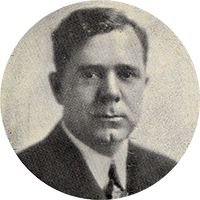(from the Dictionary of Louisiana Biography)
LONG, Huey Pierce, governor, U. S. senator. Born, Winnfield, La., August 30, 1893; son of Huey Pierce Long, Sr., and Caledonia Tison. Education: University of Oklahoma (dropped out for financial reasons); Tulane University, special student for law studies, audited courses; read law and worked with tutor preparatory to passing the bar examination. Admitted to the Louisiana bar, May 15, 1915. Married, April 12, 1913, Rose McConnell. Children: Rose Lolita, Russell Billiu, and Palmer Reid.
Opened law practice in Winnfield, specialized in workmen's Compensation cases, land titles, oil and gas, and timber sales. Won election to the Louisiana Railroad Commission (later Public Service Commission), 1918. Moved law practice to Shreveport. Served on Commission, 1918-1928, chairman, 1921-1928. While a member of the Commission oil company pipelines were placed under the regulatory authority of the Commission; the Cumberland Telegraph and Telephone Co., ordered to refund almost one-half million dollars to telephone users in the state; streetcar fares were lowered in Shreveport; natural gas prices for Louisiana consumers reduced while severance taxes raised.
Ran unsuccessfully for governor, 1924. Elected governor, 1928, in contested race against incumbent O. H. Simpson and Congressman Riley J. Wilson. During his administration from May 21, 1928, to January 25, 1932, state massively increased expenditures for public education and raised appropriations to the state university. A medical school was established. Prisons were reformed and improved. A highway-building program added 2,500 miles of paved roads, 1,308 miles of asphalt roads, and 9,000 miles of gravel roads. Major bridges built across the Mississippi and other large Louisiana rivers. Free textbooks, charity hospitals, old-age pensions, free night schools for adults, sales taxes and higher gasoline, corporate, franchise, and severance taxes were approved by the legislature. Political opposition grew amid charges of demagoguery and dictatorship, misconduct, blackmail, and usurpation of authority. Impeachment efforts failed, 1929.
Won election to U. S. Senate, 1930, but remained governor of Louisiana until January 25, 1932, when he took his Senate seat, after securing victory for the "Long" candidates to state office, headed by Gov. Oscar K. Allen. Became a major factor in national elections of 1932 as a supporter of Franklin D. Roosevelt, but thereafter became a vigorous opponent of the New Deal. Developed the Share-Our-Wealth Program which would have eliminated personal fortunes in excess of $5 million, provided every family with $5,000 with which to buy a house, car, and radio, provided for old-age pensions, minimum annual incomes, veterans bonuses, and government-paid college educations. This program caused friction with New Deal. Long actively opposed New Deal candidates for public office, and Roosevelt supporters actively opposed Long candidates in Louisiana. Internal Revenue Service investigations attempted to undermine and discredit Long and his partisans. Explored candidacy for 1936 presidential election.
Career came to an end on September 8, 1935, when shot by Dr. Carl A. Weiss, Jr., in the state capitol. Long's political influence, however, extended for many decades as state politics became divided between "Long" and "Anti-Long" factions. His brother, Earl K. Long served as lieutenant governor, 1939-1940, and as governor, 1948-1952, 1956-1960. His son, Russell B. Long served as U. S. senator for nearly forty years. Died, Baton Rouge, September 10, 1935; interred capitol grounds.
Courtesy of the Louisiana Historical Association. Used with permission.




